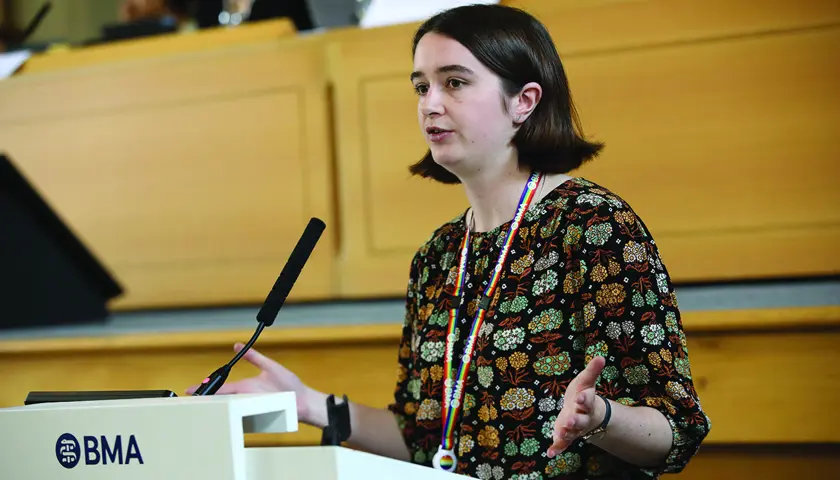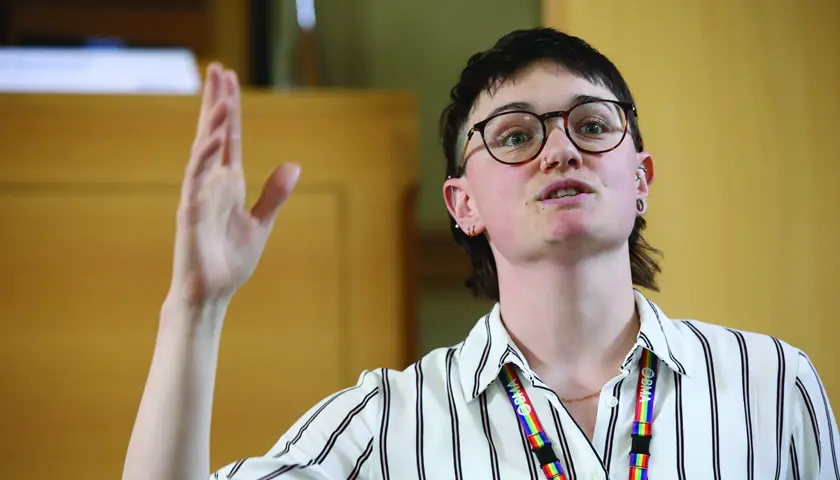
Here, there and everywhere
A new system meant to make it fairer for final-year medical students applying for their first jobs has resulted in more getting their last choice of where they wanted to work while others have been left in limbo. They tell Ben Ireland how it has left them disoriented and demoralised
‘At first I said, “I’m not going”.’
A Manchester-based final-year medical student given her 18th choice of 18 foundation schools, on the morning of her final exam, recalls the moment which left her considering whether she would accept her first offer of a job as a doctor.
‘I rang my mum in tears,’ she says. ‘She helped me focus on the immediate priority of the exam. After, one of the clinical fellows came over and asked how I found it. I broke down again; I couldn’t stop crying for three hours.’
After four to seven years of medical school, often racking up debts of tens of thousands of pounds, starting foundation school as a newly qualified doctor is daunting enough. And this year, considerably more students were not given their first, second or third choices. For many, this will mean they are further away from their support networks.
Why rank our choices if so many people are given their last choice?
This year’s intake is the first to experience the UKFPO (UK Foundation Programme) PIA (preference informed allocation) system, which was designed to give more new foundation year 1 doctors their first choices of deanery.
The UKFPO said the process would ‘allocate as many applicants to their first preference as possible’, while also removing the stress of the additional SJT (situational judgement test) students had to take under previous systems. Its modelling suggested that the PIA system would lead to almost 80 per cent of applicants receiving their first-choice foundation school, when compared to just under 74 per cent for a system based on allocation by academic performance.
While the UKFPO reported an ‘improvement’ in the proportion of this year’s medics receiving their first choice – from 71 to 75 per cent, or about 7,300 out of 9,702 – it remains lower than the 2020-21 peak of 77 per cent. Meanwhile, the rate of those who received either their first or second choices dropped from 86 to 83 per cent, and the proportion getting one of their top-five choices from 95 to 92 per cent.
The BMA medical students committee has deduced that 37 times more applicants received their lowest-ranked choice than previously, albeit from a low baseline.
New algorithm
This year, for the first time, applicants were given a computer-generated rank that did not consider their medical school performance or require an SJT.
Until 2023, applicants were ranked using a combination of these scores, which they were given before listing their foundation school choices. They were then allocated their preferred foundation schools, with a higher ranking giving more chance of receiving higher preferences.
With the new algorithm, applicants were ranked by a computer and, in this order, allocated a place on their first choice of foundation programme if available. They did not know their random rankings when they made their choices. If a place at their top choice was not available, they were skipped as the computer worked through the list to give as many students as possible their first choices. The system then worked through unassigned applicants with each allocated a place in their highest preferred programme that still had places, and this was repeated until the list was exhausted.
Applicants could choose to link their application with others, but if so would be given places based on what was available when the lower-ranking of the linked applicants was chosen by the computer. They could appeal the outcome, but only on the basis that due process was not followed.
The Manchester graduate who spoke to The Doctor, whom we have chosen not to name, had the north west at the top of her list. She was happy to be sent to any of her top three, which included Yorkshire and Humber and Trent, and would have been content with her fourth or fifth choices, West Midlands North and West Midlands Central.
Instead, she was sent to the one deanery from where she would have to fly back to see her family and her partner, Northern Ireland. The offer of her final choice skewered her plan of moving back to her family home to get on her feet financially after medical school.
‘It’s not just that moving to a different nation is expensive,’ she says, though noting Northern Ireland has the lowest hourly rate for junior doctors. ‘Being so far away will have an impact on my mental health. I tried to explain my situation, that I relied on bursaries while at university, but I was told it was not a unique circumstance. They’re treating us like numbers.’
She said the UKFPO ‘seems to be obsessed with how many people got their first choice’, suggesting: ‘Wouldn’t it be better if more people got one of their top five? People can live with that. Why rank our choices if so many people are given their last choice? It’s an absolute mess.
‘People say it’s only two years – but I want to put down roots, not be in a position where I’m waiting to move again. It’s put a real dampener on my graduation.
‘One of my friends who was in the same position isn’t going. He’s withdrawn altogether. They’ve lost a good doctor in him.’
There is no system for swaps, unless a doctor’s circumstances have changed since their initial application. The graduate says she ‘would literally swap to any other region’ and is ‘sure there are people who would swap with me too’.
In the previous system, it was common for final-year medical students to make their foundation-school choices based on allocation rankings they were given in advance.
That allowed tactical choices, for example using competition ratios from previous years to work out which less-popular foundation schools they might be happier with and putting them higher in their order so that they had more chance of getting a place they would settle for, particularly if their allocation ranking was lower.
But students say the new system made tactical choices more difficult because they only had the competition ratios to work from, not their ranking.
‘If I’d have known my ranking, assuming now that it’s probably quite low, I would have put West Midlands North first because it had a lower competition ratio,’ explains the graduate. ‘I could have feasibly lived at home and driven.’
Her feelings were supported in a debate at the recent BMA MSC conference, where a motion passed calling for final-year medical students to be given their random allocation position before they rank foundation schools, thus ‘allowing them to make an informed decision’. The MSC committee is now exploring this as it seeks to improve the PIA system.
Eleanor Sheridan, a Cambridge student, tabled the ‘unblinding’ motion, recalling how two friends in their final year during the previous system made tactical choices.
‘One of these friends is really risk-averse,’ she explained. ‘Her score was really high, so she was probably going to get what she wanted. This is the only reason she felt happy ranking highly the deanery she actually wanted; knowing her ranking was really important.
‘The other friend knew she was going to be ranked low. She knew she probably wasn’t going to get the jobs she wanted in the region she wanted. Getting the jobs she wanted was important to her, so she picked a different region knowing she would be lower ranked than she hoped.
‘They were able to make an informed decision about where they wanted to apply, based on knowing how high or low they had been ranked. With the new system that isn’t an option. You rank your deaneries with no idea what your randomised position will be.’
There’s this sense that new doctors should just be happy with whatever they’re given
She told the conference: ‘We spend four to six years being trained how to make informed decisions, and then suddenly when it comes to where we need to live and work for two years they go “nah, let’s make this as blind as possible”.
‘If people are able to make an informed decision, they’re more likely to end up somewhere they’ll be happy for those two years. That’s good – not just for us but for our patients, and everyone else we work with. Happier doctors are better doctors.’
Some suggested being given a low allocation ranking could negatively affect doctors in the crunch exam period, but Ms Sheridan said she and fellow students would ‘much rather have the information than the stress of not knowing’.
In the interim, the motion asks for newly qualified doctors who received lesser-ranked choices to be given a form of ‘reimbursement’, either financial or via support with housing – although it was noted that a relocation and travel expenses policy already exists.
The conference also backed a long-term increase in the number of foundation school places, with a focus on more densely saturated areas of application. However, MSC co-chairs Chinelo Nnadi and Shivani Ganesh said an announcement of 350 additional medical school places, which came after the debate, will only work alongside more academics and other educators and ‘improvements in the way new doctors are allocated their first role within the NHS’.
As well as those given their lowest rankings, an estimated 1,000 final-year students were initially given ‘placeholder’ positions, meaning they were assigned to a foundation school but could end up working anywhere within it, in a to-be-confirmed job. Deaneries can be as vast as all of Scotland, the entirety of Yorkshire and Humberside, or ‘Peninsula’ which covers Devon and Cornwall.
While the UKPFO says ‘all applicants are guaranteed a role and have been told where in the country they will be based’, some ‘placeholders’ were told they would only find out which hospital or trust they are to work at three weeks before starting – giving little time to find somewhere to live, or mentally prepare for the move.
The MSC, which has consistently called for better communications from the UKFPO regarding 'placeholders' since they were introduced in place of the national reserves list, pointed out that NHS England’s guidance says doctors’ work schedules should be provided at least eight weeks in advance.
But deputy chairs Rob Tucker and Luke Stephenson-Heskey said they were ‘exceedingly concerned’ this pledge would not be met for incoming foundation year 1 doctors in ‘placeholder’ posts this year.
The UKFPO says ‘almost all’ applicants have now been allocated an NHS organisation.
I couldn’t plan where I’m going to live. I couldn’t plan annual leave. I couldn’t plan any events
One ‘placeholder’ graduate who spoke to The Doctor, whom we have also chosen not to name, made her choices based on prioritising caring responsibilities and her own medical appointments as well as to save on rental costs by living at home.
She was given a ‘placeholder’ position at LNR (Leicestershire, Northamptonshire and Rutland) foundation school. Her first choice would have been in Nottinghamshire, but because that is in the wider Trent area she felt she had a better chance of being closer to home in LNR.
Despite knowing her foundation school, as a ‘placeholder’ she then had to wait a further six weeks in limbo to find out which hospital or trust she will be working at, meaning her commute could have been anything from 45 minutes to an hour and a half. Initially, she had been told to expect this information on 4 July – and that was communicated in the middle of her final exams, affecting her preparation.
‘I couldn’t plan where I’m going to live. I couldn’t plan annual leave. I couldn’t plan any events. I couldn’t even contact anyone with regards to what I need to do before I start. Nothing,’ she explains. ‘It adds a lot of stress.’
Eventually, she was told which hospital she would be working at on 30 May – and it was ‘in no way commutable’ from Nottinghamshire. But when The Doctor went to press, she was expecting to have to wait until 20 June to find out the details of her foundation year 1 job, despite now knowing where it is going to be.
She adds: ‘There’s this sense that new doctors should just be happy with whatever they’re given. That isn’t very fair. You don’t have that in other graduate jobs. It’s made me wonder whether I can progress in the medical career.
‘If our performance doesn’t matter, and it’s just down to luck, it feels like everything we’ve worked for has been for nothing.
‘The old system wasn’t perfect, but you never really heard of anyone getting their last choice. If the old system was still in place, I’m almost certain I would’ve been able to get a job at a hospital five minutes from my house. I could have at least had some level of control.’
Reduced motivation
Others share this graduate’s unhappiness with the UKFPO’s move towards ‘demeritisation’, arguing that removing the incentive of a better allocation based on medical school performance risks creating a culture of doing the least possible to pass.
Second-year international medical student Ekansh Rathore describes the situation as ‘a shambles’ and is planning to move to work in another country if he is allocated a foundation school he is unhappy with.
‘Now you just need to pass; there’s no motivation to get a merit,’ he tells The Doctor. ‘Why should someone who has performed really well miss out when someone who has just scraped through gets their first choice? The process of applying for medical school is very competitive, so you would expect the same standards when applying for foundation school. It feels like the quality is going downhill.’
He would like to see a limit placed on how far away from their preferences graduates are sent – a section of the MSC motion that did not pass – and backs financial support for those sent far away.
Mr Rathore, from Singapore, adds: ‘It’s taken me some time to adjust to living in London for medical school, and I might have to do that all over again. It’s frustrating because you have such little choice in the matter.’
Others, including the BMA, argue that better medical school performance does not necessarily mean graduates will be more competent doctors, and point to studies before now which have suggested the SJT exams were discriminatory. The BMA has said it does not want a return of the SJT exams, which involved some students travelling long distances to sit.
Stephanie Webb, a student at Oxford, says: ‘Any ranking system means people from ethnic minorities, or less affluent backgrounds, tend to do less well so don’t get the more competitive places.’
They say fixing the ‘societal issue’ of under-doctored areas is important but believe this should be done through incentives to move there. ‘There should be opportunities to do audits and research in every single region of the UK,’ they say, arguing this would even out the competition ratios and make more doctors feel like they want to stay and progress in the NHS.
Not only are would-be doctors, such as the Manchester graduate’s friend, dropping out before they begin; many say they are more likely to leave the NHS – either for another country or another profession – after their foundation years if they end up in an area they ranked lowly, exacerbating the ‘F3 and flee’ mentality already created by poor pay and conditions for junior doctors.
While medical student leaders fully accept that all areas of the UK must receive sufficient numbers of doctors, and there will be some inevitable trade-offs between students’ individual choices and achieving comprehensive recruitment, they say improvements to the system are vital.
Deputy MSC chairs Rob Tucker and Luke Stephenson-Heskey say retention is a crucial issue in this debate, not only because of the well-publicised workforce crisis but the cost to the taxpayer to train a doctor, which the Government put at £230,000 back in 2017.
Mr Tucker says: ‘We are struggling to retain doctors already, and [the allocation process] is making matters worse. You should never be locked into a profession, but if a doctor or would-be doctor’s decision to leave the NHS is based on a system issue then it is not their individual fault.’
Mr Stephenson-Heskey adds: ‘No one wants their hand held but the next generation should be supported through this massive transition from student to doctor. Students are left in the dark, feeling anxious and nothing is being resolved.’
The UKFPO ran a stakeholder engagement exercise last year in which two-thirds of respondents, mostly medical students, supported a move to PIA. The BMA wrote to the UKFPO: ‘We believe that PIA should be seen as a temporary measure while time is taken to consider a better and fairer system.’
Mr Stephenson Heskey says: ‘We wouldn’t want to go back to how it was before, but there need to be tweaks in how PIA is run.’ He is concerned that what was supported as a temporary solution may now become a permanent solution.
Students are left in the dark, feeling anxious and nothing is being resolved
Mr Stephenson-Heskey
The UKFPO is evaluating how the process has worked, and feedback it has received.
An NHS spokesperson told The Doctor: ‘Three quarters of applicants have been offered their first choice, higher than in the last two years, and the allocation process was changed after feedback from more than 14,000 medical students and other organisations including the BMA, with the vast majority opting for this process.’
Mr Stephenson-Heskey concludes: ‘The UKFPO is calling this a success, but while it works technically it doesn’t work for students.
‘We have said all along that we will work with the UKFPO to build a better solution, one that works for all students, doesn’t create anxiety and helps that transition into being a doctor.’
- If you need support, all medical students (regardless of if you are a BMA member or not) can seek free and confidential counselling from the BMA's 24/7 line on 0330 123 1245.
- Until September 2024, resident doctors were referred to as ‘junior doctors’ by the BMA. Articles written prior to this date reflect the terminology then in use







